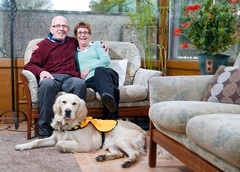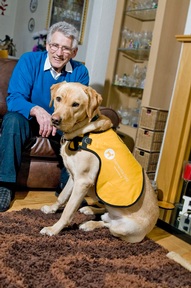UK’s first dementia dogs helping to reduce social isolation of couples affected by the condition
Two couples whose lives have been affected by dementia are being supported by specially-trained dogs as part of project designed to prevent social isolation.

Students from Glasgow School of Art’s (GSA) product design department came up with the Dementia Dog initiative, which was developed and put into action by a partnership between Alzheimer Scotland, Dogs for the Disabled and Guide Dogs Scotland.
Gordon Hush, GSA product design programme leader, said: "Dementia Dog sees GSA product design graduates extending their skills beyond the traditional domain of material manufacture into the generation of experiences that improve the quality of life of both carers and those with dementia. The ability to re-design experiences is a significant challenge and one that these young designers have risen to in an extraordinary fashion."
Kaspa, a Labrador, came from the Dogs for the Disabled socialisation scheme while Oscar, a Golden Retriever, was removed from guide dog training. Both dogs been highly trained to offer practical assistance to couples where one partner has dementia. They will also be able to help reduce social isolation.
Their training began as puppies, when they spent a year with experienced volunteers, learning how to be well-behaved and well-mannered dogs. They then moved to Forfar’s Guide Dogs Training Centre, where staff from Dogs for the Disabled began training them for their specialist roles.
Helen McCain, director of training at Dogs for Disabled, said: “For 25 years we’ve been training assistance dogs for physically disabled adults and children and more recently for children with autism. This new project has provided us all with an opportunity to bring together our skills and experience to help with a different kind of challenge.”

Kaspa and Oscar completed their training in March and went to live with couples Frank and Maureen Benham and Ken and Glenys Will, whose lives have both recently been affected by early stage dementia and were receiving support from Alzheimer Scotland.
The dogs have both settled in to their new homes well and are already making an impact on the lives of their new partners, helping them deal with dementia and the challenges it poses to everyday life. Kaspa and Oscar are also helping their couples get out of the house regularly, providing a reason to go for walks together. They are also proving to have a calming effect on the partners with the condition.
Speaking about how being involved in the project has changed their lives, Mr Benham said: "Maureen and I can't imagine going back to what it was like before we got Oscar.
“It has been a life changing experience, Maureen is already responding well to Oscar. Her conversation skills have improved already and she just loves the dog.”
Mrs Will revealed that Kaspa is having a calming effect on both her and her partner. She said: “Kaspa has given us our life back. He greets Ken in the morning, so starts Ken’s day being happy. I have noticed if Ken is agitated or unsettled Kaspa gives him a nudge so Ken talks to the dog or goes out in to the back garden and forgets what had bothered him. Kaspa has removed my fear that Ken had gone, life is so much better for both of us now. Ken is happy and it has taken so much stress away from me as well. Everyday we wake up knowing it’s going to be a good day thanks to Kaspa.”
Joyce Gray, deputy director of development at Alzheimer Scotland, said: “Dementia Dog has had a truly wonderful impact on the families involved and Alzheimer Scotland is delighted to have been part of this ground-breaking project. It’s also been a great example of partnership working. Supporting people with dementia and their families to live well with the illness requires innovative and imaginative approaches and the Dementia Dog team have brought all this and more to the project.”
Two further dogs are already receiving specialist training due to the success of the project, which is being part-funded by the Scottish Government and the UK Design Council.
Logan Anderson, manager of the Guide Dogs Scotland Training School, said: "Our change-of-career guide dogs contribute invalubale work with other assistance dogs charities, and the Dementia Dog pilot has shown not just how the dogs have provided practical benefits to those living with Alzheimer's, but also the mood-enhancing and emotional benefits as well."
If you would like to donate to the project, visit https://shop.alzscot.org/pages/donate/dementia-dog-donation.
Latest Features News
 28-Nov-19
2019 Election: Labour pledges £10.8 bn for free personal care while Boris Johnson sidelines social care
28-Nov-19
2019 Election: Labour pledges £10.8 bn for free personal care while Boris Johnson sidelines social care
 18-Oct-19
Podcast: Wendy Mitchell and dementia: 'My biggest fear is not knowing who my daughters are'
18-Oct-19
Podcast: Wendy Mitchell and dementia: 'My biggest fear is not knowing who my daughters are'
 30-Sep-19
World's oldest diver aged 96 says 'never accept the fact you are getting old'
30-Sep-19
World's oldest diver aged 96 says 'never accept the fact you are getting old'
 27-Sep-19
Exclusive: Care minister backs care workers' call for time off to grieve and attend funerals
27-Sep-19
Exclusive: Care minister backs care workers' call for time off to grieve and attend funerals
 20-Sep-19
Podcast: Gyles Brandreth urges care workers to learn poetry with elderly
20-Sep-19
Podcast: Gyles Brandreth urges care workers to learn poetry with elderly